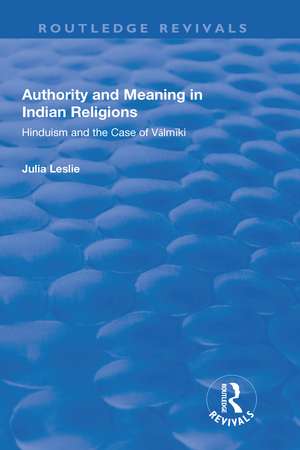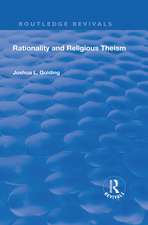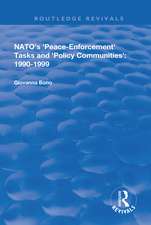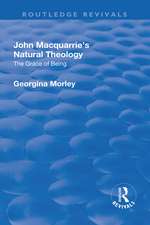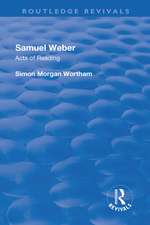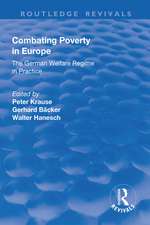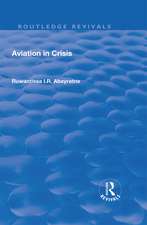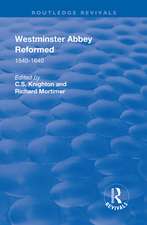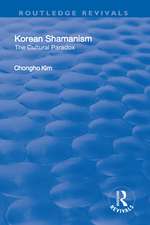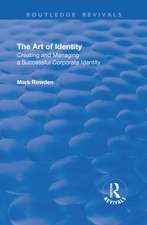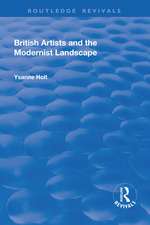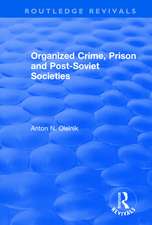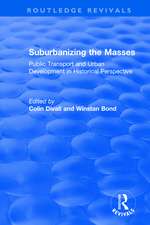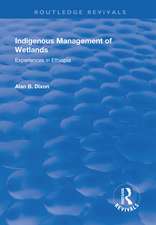Authority and Meaning in Indian Religions: Hinduism and the Case of Valmiki: Routledge Revivals
Autor Julia Leslieen Limba Engleză Hardback – 3 noi 2017
| Toate formatele și edițiile | Preț | Express |
|---|---|---|
| Paperback (1) | 210.36 lei 6-8 săpt. | |
| Taylor & Francis – 11 noi 2019 | 210.36 lei 6-8 săpt. | |
| Hardback (1) | 194.54 lei 6-8 săpt. | |
| Taylor & Francis – 3 noi 2017 | 194.54 lei 6-8 săpt. |
Din seria Routledge Revivals
- 9%
 Preț: 801.71 lei
Preț: 801.71 lei - 8%
 Preț: 432.64 lei
Preț: 432.64 lei -
 Preț: 153.83 lei
Preț: 153.83 lei -
 Preț: 230.80 lei
Preț: 230.80 lei -
 Preț: 309.79 lei
Preț: 309.79 lei -
 Preț: 258.73 lei
Preț: 258.73 lei - 9%
 Preț: 764.35 lei
Preț: 764.35 lei - 9%
 Preț: 903.42 lei
Preț: 903.42 lei -
 Preț: 311.18 lei
Preț: 311.18 lei -
 Preț: 357.45 lei
Preț: 357.45 lei - 9%
 Preț: 606.36 lei
Preț: 606.36 lei -
 Preț: 317.54 lei
Preț: 317.54 lei - 9%
 Preț: 764.30 lei
Preț: 764.30 lei -
 Preț: 257.01 lei
Preț: 257.01 lei -
 Preț: 238.40 lei
Preț: 238.40 lei -
 Preț: 259.48 lei
Preț: 259.48 lei - 9%
 Preț: 903.81 lei
Preț: 903.81 lei -
 Preț: 326.26 lei
Preț: 326.26 lei -
 Preț: 258.67 lei
Preț: 258.67 lei -
 Preț: 294.98 lei
Preț: 294.98 lei -
 Preț: 308.89 lei
Preț: 308.89 lei -
 Preț: 199.86 lei
Preț: 199.86 lei -
 Preț: 347.50 lei
Preț: 347.50 lei -
 Preț: 302.59 lei
Preț: 302.59 lei -
 Preț: 389.40 lei
Preț: 389.40 lei -
 Preț: 257.01 lei
Preț: 257.01 lei -
 Preț: 343.22 lei
Preț: 343.22 lei - 9%
 Preț: 640.91 lei
Preț: 640.91 lei - 9%
 Preț: 619.49 lei
Preț: 619.49 lei -
 Preț: 228.88 lei
Preț: 228.88 lei -
 Preț: 265.16 lei
Preț: 265.16 lei -
 Preț: 245.11 lei
Preț: 245.11 lei -
 Preț: 258.54 lei
Preț: 258.54 lei -
 Preț: 258.73 lei
Preț: 258.73 lei -
 Preț: 368.93 lei
Preț: 368.93 lei -
 Preț: 246.38 lei
Preț: 246.38 lei - 9%
 Preț: 832.08 lei
Preț: 832.08 lei -
 Preț: 258.67 lei
Preț: 258.67 lei -
 Preț: 286.99 lei
Preț: 286.99 lei - 18%
 Preț: 695.86 lei
Preț: 695.86 lei - 9%
 Preț: 934.96 lei
Preț: 934.96 lei - 5%
 Preț: 243.38 lei
Preț: 243.38 lei -
 Preț: 274.69 lei
Preț: 274.69 lei -
 Preț: 200.67 lei
Preț: 200.67 lei - 9%
 Preț: 638.62 lei
Preț: 638.62 lei -
 Preț: 259.69 lei
Preț: 259.69 lei - 9%
 Preț: 1038.47 lei
Preț: 1038.47 lei -
 Preț: 389.46 lei
Preț: 389.46 lei -
 Preț: 302.14 lei
Preț: 302.14 lei -
 Preț: 302.27 lei
Preț: 302.27 lei
Preț: 194.54 lei
Preț vechi: 232.77 lei
-16% Nou
Puncte Express: 292
Preț estimativ în valută:
37.22€ • 38.87$ • 30.74£
37.22€ • 38.87$ • 30.74£
Carte tipărită la comandă
Livrare economică 15-29 aprilie
Preluare comenzi: 021 569.72.76
Specificații
ISBN-13: 9781138708723
ISBN-10: 1138708720
Pagini: 262
Dimensiuni: 156 x 234 x 22 mm
Greutate: 0.64 kg
Ediția:1
Editura: Taylor & Francis
Colecția Routledge
Seria Routledge Revivals
Locul publicării:Oxford, United Kingdom
ISBN-10: 1138708720
Pagini: 262
Dimensiuni: 156 x 234 x 22 mm
Greutate: 0.64 kg
Ediția:1
Editura: Taylor & Francis
Colecția Routledge
Seria Routledge Revivals
Locul publicării:Oxford, United Kingdom
Cuprins
Contents: Situating the problem; Contextualizing the person; Identifying 'Valmiki' in early Sanskrit texts; Tracing motifs in Sanskrit and vernacular texts; Drawing conclusions for today; Glossary; Bibliography; Index.
Recenzii
'This extraordinary book marshals unimpeachable scholarship, rich in fascinating historical detail and mythological imagination, to tackle questions that are angrily, sometimes violently, debated in both scholarly and faith communities everywhere today: Who has the right to talk about someone else's religion? A fascinating study of untouchables, caste rivalries, the mythologizing of history, and the revolutionary rise of a low-caste religion of devotion.' Wendy Doniger, University of Chicago 'An interesting and important book: I found it both fascinating and novel in the way that it brings together textual issues and contemporary concerns. It breaks significant new ground in a rigorous and illuminating manner, accessible to all. I warmly recommend it.' John Brockington University of Edinburgh. 'A remarkable feat of scholarship. I particularly relish the way in which Julia Leslie interweaves her concern to understand the emotive issues of identity that beset a contemporary UK South Asian community with her painstaking and authoritative detective work on Sanskrit texts.' Eleanor Nesbitt, University of Warwick 'This is an important book that contributes not only to Hindu Studies but also to contemporary debates about culture and meaning in a multicultural context. This is excellent scholarship that draws on a wealth of learning, takes seriously the importance of texts in any understanding of contemporary Hinduism, and is very well written.' Gavin Flood, Stirling University 'This important and scholarly book by Julia Leslie breaks entirely new ground. Elegantly written and lucidly argued, it should be read by everyone interested in Hindu Studies or in contemporary debates about the politics of recognition, self-representation and identity in a multifaith society. It will also be warmly welcomed by all whose who are interested in Dalit (ex-untouchables) communities as it brings together and evaluates a wealth of material both in India and the UK... What is ultimately impressive about this book is the model of scrupulous and responsible scholarship if offers in seeking to deconstruct the conflicting understandings of different religious communities... this fascinating and eirenic book can be read with advantage by anyone engaged in intro-or inter-faith dialogue.' Interreligious Insight 'This is an important addition to scholarship and a book that I know I will be using on many occasions in my teaching, not only in courses on South Asian religion but also in more methodological introductions to the study of religions... a book that tells us much about authenticity, narrative construction, truth-claims and identity formation.' Bulletin of the British Association for the Study of Religions 'Leslie's book is a testament to the energy of an engaged scholar bringing together religious and scholarly communities, numerous footnores indicating reponses from colleagues consulted.' Journal of Punjab Studies 'One of Leslie's final projects, this book is an impressive testament to both her meticulous and wide-ranging scholarship on Indian religion and her deep engagement with its social and cultural context... Apart from a magisterial survey and analysis of Sanskrit and vernacular sources on the poet's legend, the book offers an insightful discussion of the socio-cultural politics of 'untouchability' both in India and in its diaspora, and a timely meditation on the role and limitations of academic scholars in clarifying vexed issues of religious and ethnic identity. The book is thus at once a lasting contribution to religious and historical research, an important intervention in contemporary 'culture wars', and a revealing study of the aspirations and struggles of a still-marginalized and oppressed community.' Religious Studies Review '... a fascinating take of how religious authority and meaning are constantly (re)negotiated, and the tensions between historical data and religious meaning. Throughout the book, Leslie sensitively and self-reflexively contemplates the rights and duties of scholars... Her own skillful scholarly historicising is evident throughout... Topics are clearly laid out throughout the book, with numerous helpful summaries.' Religion
Descriere
This title was first published in 2003. For Hindus and non-Hindus, in India and beyond, Valmiki is the poet-saint who composed the epic Ramayana. Yet for a vocal community of Dalits (ex-untouchables), Valmiki is God.
